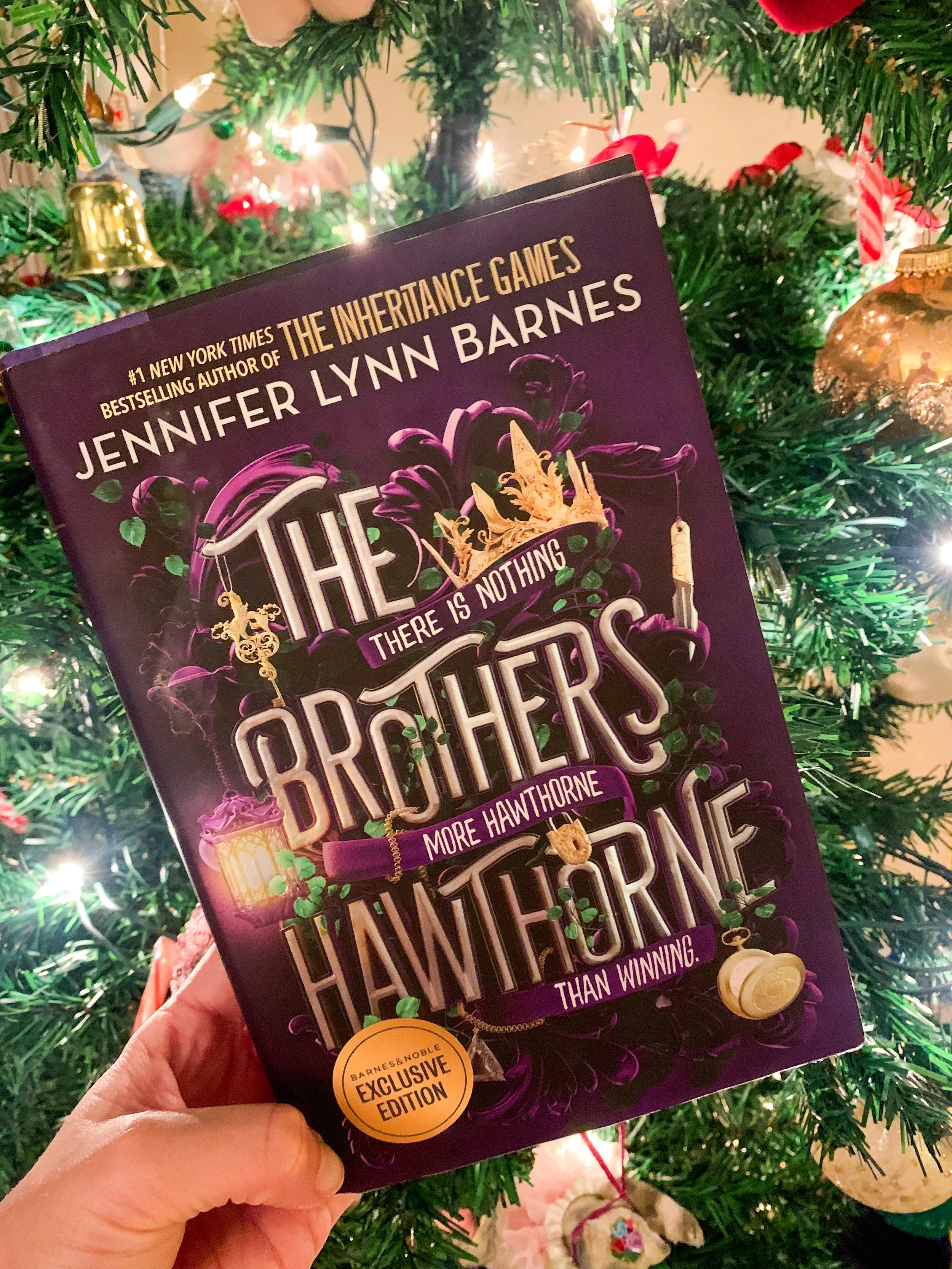The Brothers Hawthorne
The Brothers Hawthorne Book Review
You know, this book is pretty good! You might be taken aback by my surprise, but Jennifer Lynn Barnes’ series about the wealthy Hawthorne family has been fun at best and poorly characterized at worst.
The entire series has been carried on its entertaining elements: from the puzzles, riddles, and enjoyable (albeit predictable) twists and turns, only the plot and its labyrinthine lines has made these books enjoyable at all.
However, this book tones down the puzzles and focuses a little more on the characters, a recipe that works really well for me and what I’ve essentially been begging Barnes to do since the first title, The Inheritance Games.
This novel, called The Brothers Hawthorne, is a misnomer. It’s only about two of the brothers, Jameson and Grayson, leaving Nash and Xander as one-dimensional as they’ve always been. But hey, I’ll take it. Two brothers getting some characterization is better than the zilch we’ve been getting in previous books.
The book alternates POV’s between Jameson and Grayson, chronicling different plotlines of them trying to solve two very different mysteries.
Jameson’s story follows a rather thin chain of events where he gets entangled with a secret club called The Devil’s Mercy. The club boasts clients of only the rich and powerful variety, a club that Jameson can’t help but be tantalized by.
Jameson’s chapters simply follow him trying to get into The Devil’s Mercy, gain the attention of the man in charge, the Proprietor, and then solving a puzzle put forth by the Proprietor against other competitors for Vantage, a Scottish castle that belongs to Jameson’s estranged father.
The focus on Jameson, for lack of a better description, is boring and ridiculous. It’s in my opinion that Barnes couldn’t think of anything better for Jameson to do than finding more rich people who are also hungry and who also love to play games. I like the bits with Jameson and his father, but there weren’t enough scenes of them.
Unfortunately, only a handful are sporadically sprinkled throughout the book. If there had been more of Jameson coming to terms with his complicated relationship with his mysterious father, it would have been much more interesting than anything dealing with The Devil’s Mercy.
Grayson’s plotline, on the other hand, is handled with much more care and consideration. Even though the stakes are much lower (no Scottish castles or jumping onto bell towers) it's a hundred times more intriguing because I actually learned about Grayson’s emotions, his ties to his family, and his flaws. With Jameson, you kind of do, but it’s shallow and not nearly as deep as Grayson’s begrudging affection for his half-sisters.
Grayson’s story essentially revolves around keeping the true nature of Sheffield Grayson (his father) dead and buried and away from his sisters. He sabotages their efforts in learning what happened to Sheffiled Grayson with the mentality of protecting them. However, the more time he spends with them, the more his affection—and his guilt—grows.
While not the most novel of plotlines to exist, the emotions feel real at the very least. It’s the first time in the entire series where Grayson and Jameson feel like different, distinct people to me and not just pretty archetypes for Avery to agonize over.
Grayson’s family dynamics fascinated me much much more than any cockamamie game Jameson was playing in England because he’s constantly hungry due to an inferiority complex stemming from childhood.
The relationships Grayson builds with his sisters and their mother, in addition to coming to terms with the fact that he’s not perfect and certainly not okay, is a heavier reckoning than Jameson trusting Avery with a secret that’s not that deep and not that interesting.
Speaking of Avery, her bits were so painful that it hurt.
Every time Jameson or Grayson mention her I wanted to retch. Her and Jameson are just so perfect together. Perfect to the point that it’s unrealistic and fake. Every time Jameson solves a riddle, Avery is right there with him, equal in terms of logic and intelligence.
I get that Barnes wants to portray Avery as smart, but the idea that they’re completely and utterly synchronized every single step of the way feels so paltry and disingenuous that it makes me actively dislike any part of the book that contains both of them.
Jameson on his own is tolerable. Jameson “burning” for Avery and “breathing” for Avery is absolutely stupid. Thank goodness she was just a side character in this and didn’t have her own POV.
Other than the complaints about Avery, The Brothers Hawthorne is an enjoyable read. Could the characterization be more complex and sophisticated? Yes. Is the plot pretty foolish and duplicitous? Yes. Is it more enjoyable than the last few books of the same series? Also, yes.
Will I read the next installment? Unfortunately, yes.
While The Brothers Hawthorne is a step in the right direction, these books are still more candy cotton fun than true substance. You know what though? Sometimes that’s okay. Not every book you read has to have an intricate plotline with heavy elements and intense characters.
Sometimes books can just be fun.
Sometimes all you want is cotton candy.
Recommendation: The Brothers Hawthorne is probably my favorite book in the series since The Inheritance Games. If you’re still on the Jennifer Lynn Barnes’ bandwagon, don’t jump off now. Read The Brothers Hawthorne and enjoy the morsels of characterization that get tossed your way.
Score: 7/10







